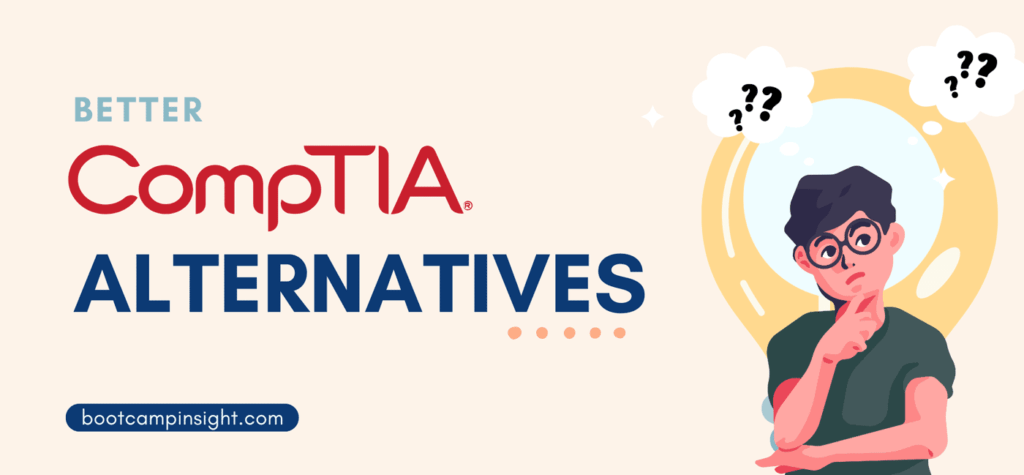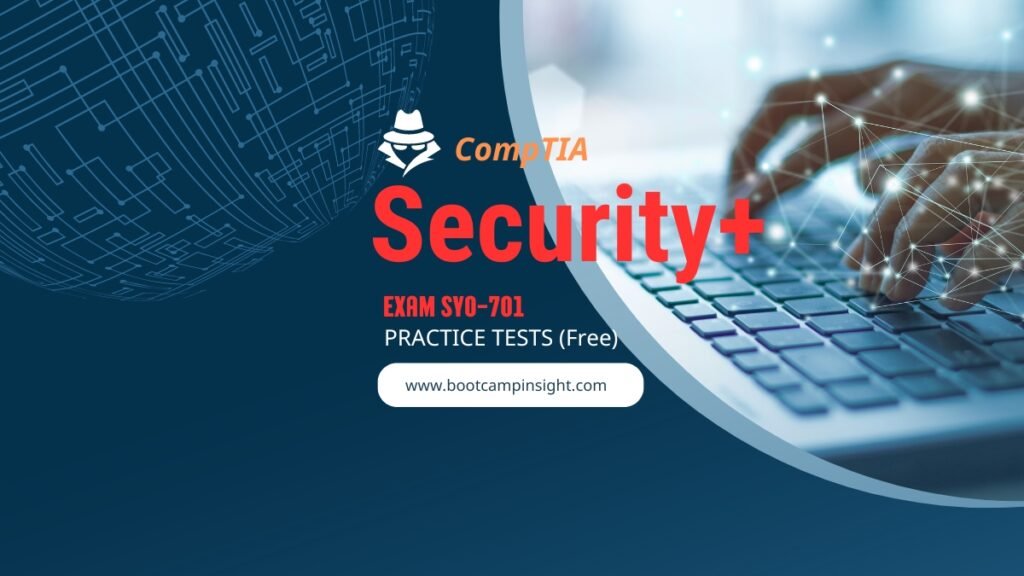When considering IT certifications, the question isn’t just What is Better Than CompTIA but rather which certification best aligns with your career goals. CompTIA’s A+, Network+, and Security+ are widely respected, especially for newcomers to IT, as they provide a vendor-neutral foundation and cover a broad range of essential topics. However, they aren’t the only option. Depending on your chosen career path, alternative certifications might offer greater value, specialized knowledge, or advanced career opportunities.
In this article, we’ll dive into these alternatives, comparing them with CompTIA certifications to help you make an informed choice on the certification path that suits you best.
Table of Contents
What is Better Than CompTIA? What to Look for in the Alternatives
The best certification depends on your chosen career path and current job experience. When deciding on an alternative to CompTIA certifications, it is important to examine evaluate several factors:
- Industry recognition: The certification should be recognized by businesses and recruiters in your selected field.
- Cost and resources: Compare the cost of the exam and the availability of study materials, courses, and prep tools.
- Scope of knowledge: Understand whether the certification focuses on vendor-specific technologies or offers a broad, vendor-neutral curriculum. Sometimes vendor-specific
With these factors in mind, let’s dive into the top alternatives to the most popular CompTIA certifications.

There is no harm in seeking alternatives, but I’d recommend the CompTIA A+ certification. It’s widely recognized, vendor-neutral, and covers many IT fundamentals, making it an excellent foundation for various IT careers. However, if you’re looking for alternatives, here are few options:
1. Microsoft Technology Associate (MTA)
- Overview: The Microsoft Technology Associate (MTA) is an entry-level certification that covers Microsoft technologies, networking fundamentals, and security basics.
- Comparison: While CompTIA A+ provides a vendor-neutral foundation, the MTA is ideal for those planning to work in a Microsoft environment.
- Best for: Those who want to specialize in Microsoft systems early in their career.
2. Cisco Certified Technician (CCT)
- Overview: CCT focuses on supporting and maintaining Cisco networking equipment. It’s vendor-specific, with a strong emphasis on networking.
- Comparison: Unlike A+, which covers general IT support, CCT is narrowly focused on Cisco technologies, making it a good choice for networking enthusiasts.
- Best for: Network technicians working with Cisco products.
3. Google IT Support Professional Certificate
- Overview: Offered by Google through platforms like Coursera, this beginner-friendly certificate is a cost-effective alternative that covers IT fundamentals.
- Comparison: While similar in scope to A+, the Google certificate is backed by a tech giant and is available at a lower price point with flexible online learning options.
- Best for: Those seeking an affordable, self-paced learning path.
I recommend CCNA over Network+ if you’re serious about a networking career. CCNA offers deeper knowledge, is more advanced, and is highly recognized in the industry, especially for those working with Cisco technologies. For general networking basics, Network+ is good, but CCNA provides better long-term value.
1. Cisco Certified Network Associate (CCNA)
- Overview: CCNA is one of the most well-known networking certifications, covering a broader and more advanced range of networking topics than Network+.
- Comparison: While Network+ is vendor-neutral and a solid introduction to networking, CCNA dives deeper into Cisco technologies and is recognized as more advanced in the field.
- Best for: Networking professionals aiming for roles involving Cisco systems or those seeking advanced network knowledge.
2. Juniper Networks Certified Associate (JNCIA-Junos)
- Overview: JNCIA-Junos focuses on networking fundamentals using Juniper Networks’ platforms. It provides a deep dive into Juniper’s proprietary systems.
- Comparison: This is a more specialized certification compared to Network+, which offers broad knowledge. However, JNCIA-Junos can be a great asset in organizations that use Juniper equipment.
- Best for: Network engineers working with Juniper products.
Security+ is a popular and well-recognized certification, so it’s definitely a good choice. However, if you’re considering alternatives, here are a few other options that are also widely recognized and respected:
1. Certified Information Systems Security Professional (CISSP)
- Overview: CISSP is a gold standard for experienced cybersecurity professionals, focusing on security management and best practices.
- Comparison: CISSP is significantly more advanced than Security+, catering to seasoned professionals with at least five years of experience.
- Best for: Security managers and professionals aiming for senior-level roles.
2. Certified Ethical Hacker (CEH)
- Overview: CEH emphasizes ethical hacking and penetration testing techniques, providing practical knowledge of offensive security.
- Comparison: While Security+ focuses on general security principles, CEH dives into ethical hacking and real-world testing, making it ideal for aspiring penetration testers.
- Best for: Those interested in ethical hacking and hands-on penetration testing.
3. GIAC Security Essentials (GSEC)
- Overview: GSEC is a versatile certification covering a wide range of security topics with an emphasis on hands-on skills.
- Comparison: GSEC offers a more in-depth, practical approach to security fundamentals compared to the theory-heavy Security+.
- Best for: Security professionals looking for both theoretical and practical security knowledge.
4. Systems Security Certified Practitioner (SSCP)
- Overview: SSCP is an intermediate-level cybersecurity certification that focuses on the hands-on, technical aspects of implementing, monitoring, and administering IT infrastructure using security best practices.
- Comparison: SSCP bridges the gap between Security+ and CISSP, providing a deeper dive into technical security skills while not requiring the extensive experience of CISSP.
- Best for: IT professionals with 1-2 years of experience in hands-on security roles, such as security analysts, network security engineers, or system administrators.
For versatility, go with LPIC-1 as it’s vendor-neutral and suits any Linux environment. If targeting a specific enterprise, RHCSA is ideal due to Red Hat’s dominance. Linux+ is also a good choice.
1. Red Hat Certified System Administrator (RHCSA)
- Overview: RHCSA is a highly regarded certification focusing on Red Hat Enterprise Linux systems, widely used in enterprise environments.
- Comparison: Linux+ provides a vendor-neutral foundation, but RHCSA is more recognized in enterprise settings, particularly for Red Hat systems.
- Best for: IT professionals working in Red Hat-based environments.
2. LPIC-1 (Linux Professional Institute Certification)
- Overview: LPIC-1 is a globally recognized certification for Linux administrators, offering broad Linux knowledge without focusing on a single vendor.
- Comparison: Like Linux+, LPIC-1 is vendor-neutral, but it offers a more comprehensive and recognized curriculum in the Linux community.
- Best for: Professionals looking for a strong, vendor-neutral Linux certification.
There are not enough employers looking for candidates with CompTIA Cloud+. It’s more beneficial to identify which cloud certification is more popular in your location and pursue that vendor-specific certification, depending on job demand. Here are few alternatives:
1. AWS Certified Solutions Architect – Associate
- Overview: AWS is a leader in cloud services, and this certification is ideal for those working with Amazon Web Services. It covers designing and deploying scalable systems on AWS.
- Comparison: AWS certification is specific to Amazon’s ecosystem, while Cloud+ covers multi-cloud environments. AWS is often preferred by employers for cloud roles.
- Best for: Cloud architects and engineers working with AWS.
2. Google Cloud Associate Cloud Engineer
- Overview: This certification covers Google Cloud services, preparing candidates to deploy and manage cloud solutions using GCP.
- Comparison: Google Cloud certification is ideal for those working in a Google ecosystem, offering in-depth knowledge, while Cloud+ remains more general.
- Best for: IT professionals focusing on Google Cloud Platform.
3. Microsoft Certified: Azure Administrator Associate
- Overview: This certification focuses on managing Azure services, including computing, networking, and storage.
- Comparison: Like the AWS certification, Azure Administrator Associate focuses on Microsoft’s cloud, while Cloud+ is vendor-neutral.
- Best for: Those working in or aspiring to Azure cloud management roles.
If you’re aiming for a management or leadership role, CISM is the best choice. For auditing and compliance, CISA is ideal. If you want to specialize in threat detection and technical analysis, GCIA is a stronger option than CySA+.
1. Certified Information Security Manager (CISM)
- Overview: CISM is management-focused and designed for individuals who manage an organization’s information security program.
- Comparison: While CySA+ focuses on technical analysis, CISM emphasizes strategic management and leadership in security.
- Best for: Cybersecurity managers and leaders.
2. Certified Information Systems Auditor (CISA)
- Overview: CISA is a globally recognized certification for professionals involved in auditing, control, and assurance.
- Comparison: CISA focuses on audit and compliance, while CySA+ is more hands-on and technical.
- Best for: IT auditors and compliance professionals.
3. GIAC Certified Intrusion Analyst (GCIA)
- Overview: GCIA focuses on detecting and analyzing network intrusions, making it a highly specialized certification.
- Comparison: GCIA is more advanced than CySA+ and focuses on deep technical skills in intrusion detection.
- Best for: Professionals specializing in threat detection and analysis.
When to Choose CompTIA Certifications
CompTIA certifications still have their place, especially for beginners or those looking for broad, vendor-neutral knowledge. If you want to gain a solid foundation in IT, networking, or security, CompTIA certifications could be a good place to start. They are also generally acknowledged across industries and frequently serve as gateways to higher-level certificates.
Let’s wrap this up, while CompTIA offers excellent certifications, there are many strong alternatives that may provide better value depending on your career path. Whether you are looking to specialize in networking, cloud computing, security, or Linux, exploring other certifications like CCNA, CEH, AWS, or RHCSA may lead to better opportunities in certain fields. Evaluate your goals and choose the certification that best aligns with your career aspirations.



